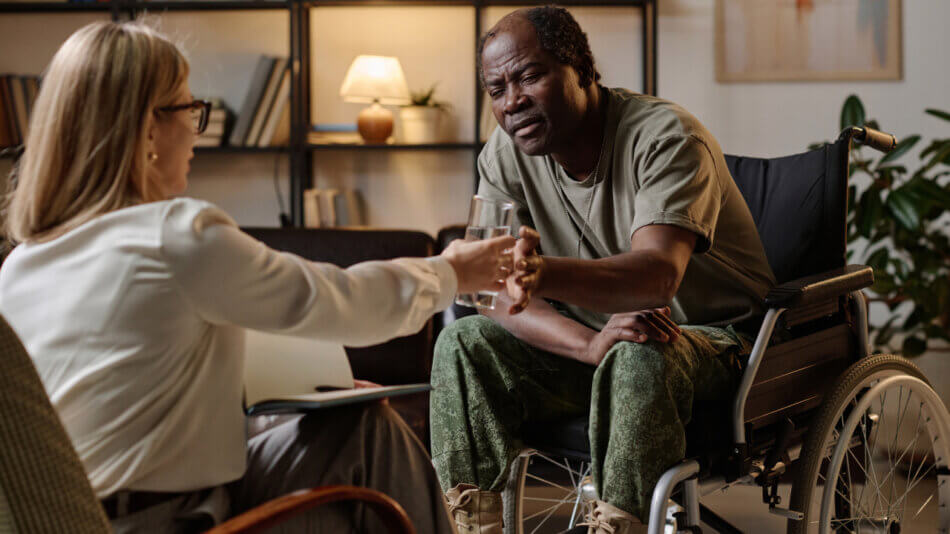Trauma is a complex and multifaceted issue. It can profoundly impact an individual’s mental, emotional, and physical well-being.
As mental health professionals, understanding the intricacies of trauma is crucial. It’s not just about recognizing its signs and symptoms. It’s about comprehending the deep psychological and social dynamics at play.
This article aims to delve into the various effective treatment options for trauma. It seeks to provide practical advice and strategies that can be applied in counseling sessions.
We will explore a range of therapies, from trauma-focused cognitive-behavioral therapy to somatic experiencing. We’ll also discuss the role of medication and complementary approaches like mindfulness and meditation.
The goal is to equip you with a deeper understanding of trauma treatment. This knowledge can enhance your skills, enabling you to provide more effective support to your clients.
Understanding Trauma and Its Impact
Trauma is a response to deeply distressing or disturbing events that overwhelm an individual’s ability to cope. It can happen from one event, many events, or a situation that is dangerous or life-threatening.
The impact of trauma is profound and far-reaching. It can lead to serious emotional, psychological, and physical distress. Trauma can disrupt daily life and impair the individual’s ability to function. Understanding this impact is the first step towards effective trauma treatment.
Recognizing the signs and symptoms of trauma is crucial for effective intervention. These may include emotional distress, intrusive thoughts, difficulty sleeping, and physical symptoms like headaches or nausea. After a traumatic event, some people may have difficulty thinking clearly or behaving normally. They may feel more easily annoyed or avoid reminders.
However, it’s important to note that trauma responses can vary greatly from person to person. Some may exhibit clear signs of distress, while others may appear to be coping well on the surface.
Trauma Treatment Options: An Overview
Numerous treatment options are available for trauma. These range from traditional psychotherapies to more holistic approaches. The choice of treatment often depends on the individual’s specific needs and preferences.
Trauma-Focused Cognitive-Behavioral Therapy (TF-CBT)
Trauma-Focused Cognitive-Behavioral Therapy (TF-CBT) is a highly effective treatment for trauma. It helps individuals understand and manage their emotional responses to traumatic events.
TF-CBT involves techniques such as cognitive restructuring, exposure therapy, and stress management. It aims to help individuals process their trauma and develop healthier coping mechanisms.

Eye Movement Desensitization and Reprocessing (EMDR)
Eye Movement Desensitization and Reprocessing (EMDR) is another effective treatment for trauma. It involves the use of eye movements to help process traumatic memories.
EMDR can be particularly beneficial for individuals who struggle with intrusive thoughts or flashbacks. It helps to reduce the intensity of these experiences and promote healing.
Complementary Approaches: Mindfulness and Meditation
Mindfulness and meditation can serve as valuable complements to traditional trauma therapies. These practices promote relaxation, increase self-awareness, and help individuals manage stress. They can be particularly beneficial in helping individuals stay grounded and present, reducing the impact of intrusive thoughts and flashbacks associated with trauma.
The Role of Medication in Trauma Treatment
Medication can play a crucial role in trauma treatment, particularly in managing symptoms such as anxiety and depression. While not a standalone solution, it can provide temporary relief and make it easier for individuals to engage in therapeutic interventions. Always remember, medication decisions should be made in collaboration with a qualified healthcare provider.
Building Resilience and Coping Skills
Building resilience and coping skills is a vital part of trauma treatment. These skills empower individuals to manage stress, navigate challenges, and recover from setbacks. Therapists can help clients develop these skills through various techniques, including cognitive-behavioral strategies, mindfulness practices, and problem-solving exercises.
Adolescent Mental Health deserves special attention when addressing trauma. Adolescents are particularly vulnerable because of the developmental changes they are undergoing. Trauma during these formative years can significantly impact their mental health, leading to issues such as anxiety, depression, and behavioral problems.
Utilizing approaches like Trauma-Focused Cognitive-Behavioral Therapy (TF-CBT) and incorporating support systems within schools and communities can be critical. It’s essential for mental health professionals to remain vigilant and provide targeted interventions that consider the unique needs of adolescents.
Fostering a sense of self-efficacy and optimism can also contribute to resilience. Helping clients recognize their strengths, set achievable goals, and stay positive can improve their ability to deal with trauma. Remember, resilience is not about avoiding stress but learning to thrive amidst adversity.
Tailoring Treatment to the Individual
Effective trauma treatment requires a personalized approach. It’s crucial to consider the client’s unique experiences, needs, and goals. By integrating various treatment options and strategies, therapists can provide comprehensive care that promotes healing, resilience, and overall well-being.
At Centered Health, we understand that trauma profoundly affects your mental and emotional well-being. We are dedicated to recognizing the impact of trauma and providing personalized care in a safe, supportive environment.
Our team of experts is committed to guiding you through your trauma recovery journey with compassion and skill. We offer private treatment centers for teens and adults, ensuring you receive the care you need to heal and thrive.
When you’re ready to start your recovery, know that we are here to support you every step of the way.
Beachside Teen Treatment Center in Malibu, CA
Hillcrest Adolescent Treatment Center in Agoura Hills, CA










